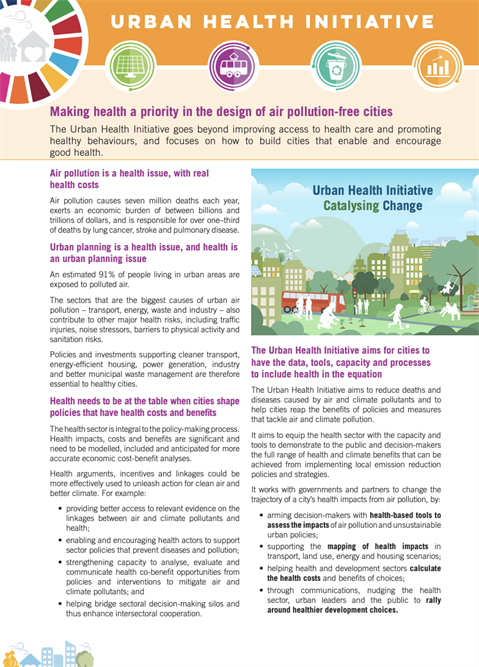Urban Health Initiative
Making health a priority in the design of air pollution-free cities

Overview
The Urban Health Initiative aims for cities to have the data, tools, capacity and processes to include health in the development equation.
- Mapping the current situation, policies and decision-making processes
Assessing the present state of air quality, climate and air pollutant emissions and their sources, identifying expected health impacts and identifying gaps in the ability to collect comprehensive data that supports policy actions. This stage involves mapping all relevant stakeholders.
- Adaptation and applying health and economic tools in the local context
Adapting and applying available tools to assess the health and economic impacts of policies.
- Developing and testing scenarios
Alternative scenarios based on policy options are tested or considered locally to estimate potential health and economic impacts, and preferred policy scenarios or interventions are identified. Health impact and co-benefits are measured, as well as the costs of both inaction and intervention. Cost-effectiveness and cost-benefit analysis are conducted. A city-level action plan, strategy or roadmap is developed to implement the most impactful strategies identified that are appropriate for the local context.
- Building capacity to fill gaps at all stages
Health actors at the policy, programme and service delivery levels are trained to engage in cross-sector policy-making processes, carry out relevant health analyses and communicate effectively with the public on links between climate and air pollutants and health.
- Communications and outreach to sustain and mobilize support
Urban leaders and champions are engaged to communicate costs of inaction, including through the global BreatheLife Campaign, further adding to the demand for action. Health care workers advise patients and communities about prevention. Targeted outreach to policy-makers and the health sector is conducted, and workshops are implemented. This step includes public outreach and raising awareness. A citywide communications campaign including media training, outreach and social marketing is conducted. Health and economic arguments provide urban leaders with incentives to act.
- Monitoring results and refining policy
Development of a monitoring framework establishes a tracking mechanism to follow up on policy change and results from city initiatives to address air pollutants and their sources, as well as their link to health.
Addressing air pollution makes sense health-wise and as an investment in a clean and liveable future.
